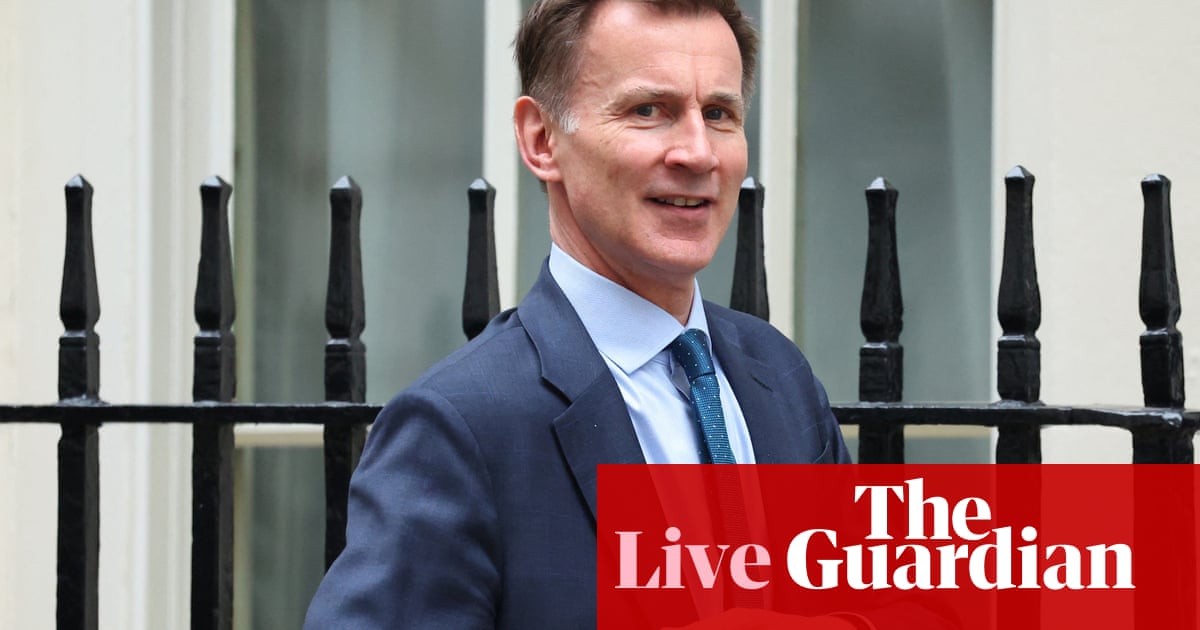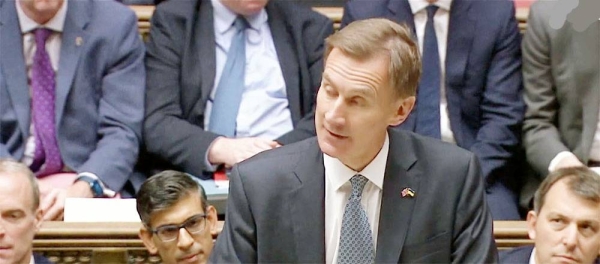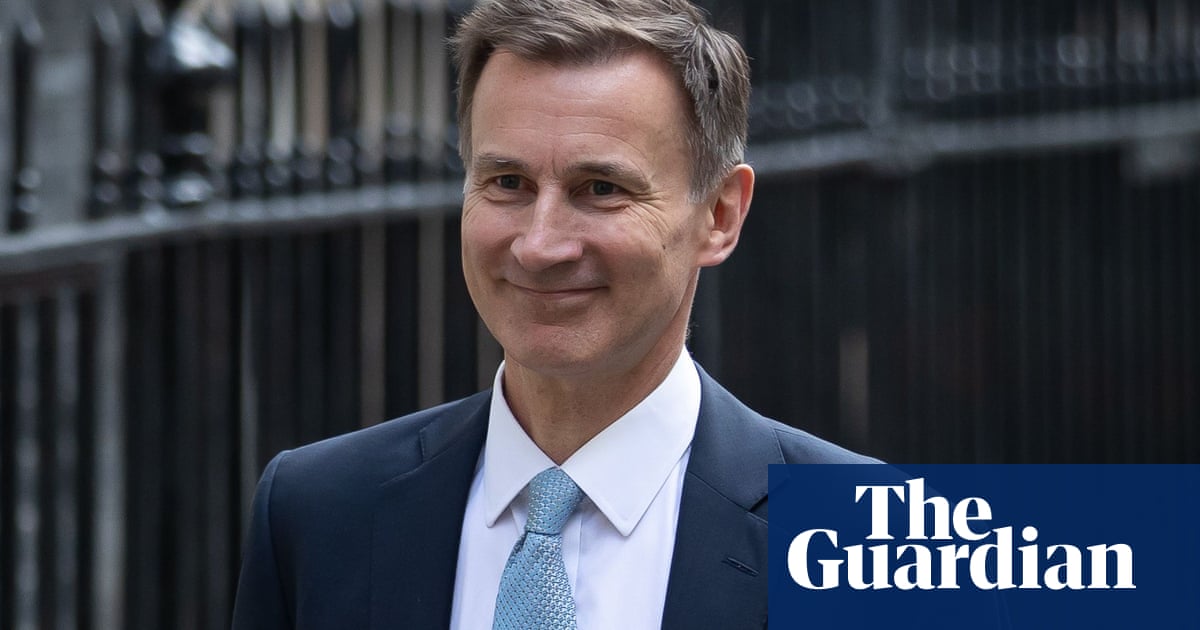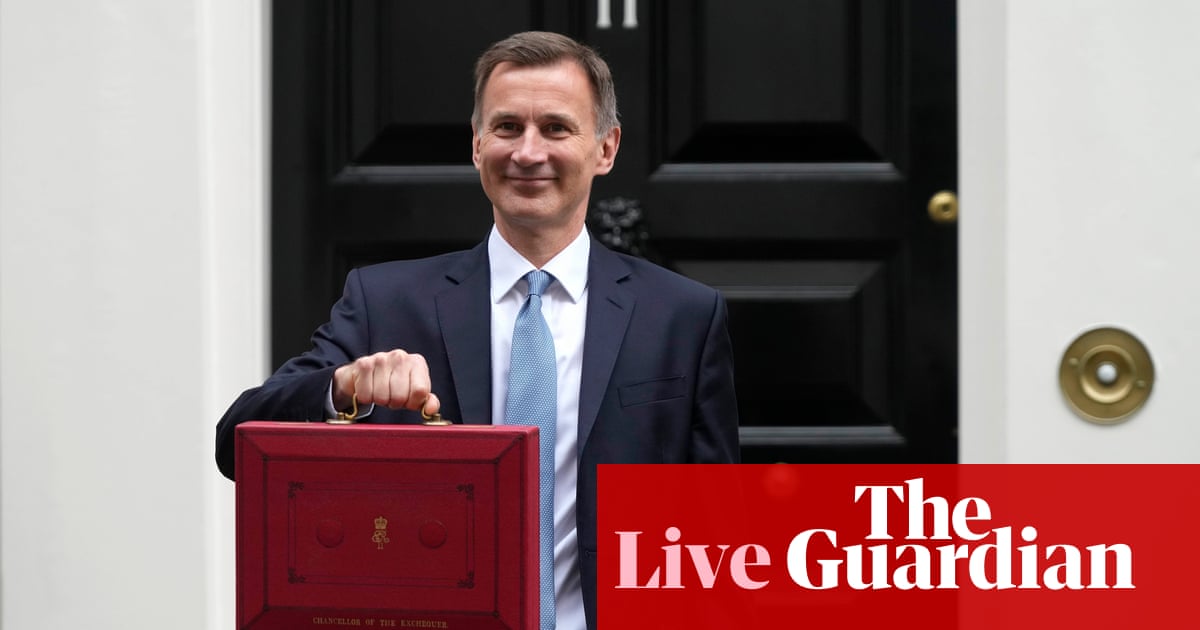
Hunt hints at October election, saying that would allow spending review before next April
Jeremy Hunt, the chancellor, has told the Lords economic affairs committee that a spending review could just about be carried out in time for next April (the start of the next financial year) if the election is held in October. The government has ruled out a spending review before polling day.
For obvious reasons, this has been seen as a hint as to when the general election might be.
Hunt told the committee:
This particular spending review has to be complete before next April, when the next financial year starts.
And of course if the general election is in October that will mean it’s very very tight and that is why we are thinking in advance about the most important element of that spending review which is the productivity element.
A spokesperson for Rachel Reeves has been in touch to say that, in the extracts from her Mais lecture released overnight, she is not saying that Margaret Thatcher ushered in a “decade of renewal”.
Here is the quote in full.
I remain an optimist about our ability to rise to the challenges we face. If we can bring together public and private sectors, in a national mission – directed at restoring strong economic growth across Britain.
When we speak of a decade of national renewal, that is what we mean. As we did at the end of the 1970s, we stand at an inflection point, and as in earlier decades, the solution lies in wide-ranging supply-side reform to drive investment, remove the blockages constraining our productive capacity, and fashion a new economic settlement, drawing on evolutions in economic thought.
A new chapter in Britain’s economic history. And unlike the 1980s, growth in the years to come must be broad-based, inclusive, and resilient.
The spokeperson accepts that, when Reeves talks about supply-side reforms offering the solution “as in earlier decades”, she is referring to the 1980s. But Reeves is not endorsing the whole Thatcher experience, the spokesperson suggested. The spokesperson said that, in the sentence “when we speak of a decade of national renewal, that is what we mean”, she is referring to what she was talking about in the previous sentence (what might happen under Labour), not to what she references in the following sentence (what happened under Thatcher).
I’ve amended the headlines in the posts at 9.16am and 12.44pm to make allowance for this.
Early evening summary
Jeremy Hunt has suggested that a general election could be held in October.
A Labour government will make fighting global heating a priority for the Bank of England as it seeks to put environmental sustainability at the heart of its plans to grow the economy, Rachel Reeves, the shadow chancellor, is to announce. She has also been criticised by Labour leftwingers for saying the party Labour wants an “inclusive” version of the supply-side policies that led to economic revival following Margaret Thatcher’s election in 1979. (See 12.44pm.)
The BBC has apologised for referring to Reform UK as “far-right” after a complaint from the lawyers for the party’s leader, Richard Tice.
Rishi Sunak’s Rwanda deportation bill could be forced on to the statute books without fulfilling the government’s legal commitment to independent scrutiny, the former borders watchdog has told peers.
We are now closing this blog, thanks for following developments with us today.
Drakeford quits as first minister saying "if you"re in progressive politics, stick to things that will make greatest difference"
Mark Drakeford has taken his final question session in the Senedd as Wales’ first minister. And towards the end of proceedings in the chamber today he delivered a resignation statement, in which he argued that progressive politicians should always do what’s best for future generations, regardless of the opposition they will face from vested interests.
He said:
My influence as first minister has been to use the mandate, my party, my government secured, to keep the promises we made to people across Wales, and to do so with the wellbeing of future generations always as our guiding principle.
And that meant being prepared to do things which are difficult because we know that the benefits will lie in the lives of the generations to come.
And if you set out to be that radical, reforming government, then you have to be prepared for opposition. As we’ve heard this afternoon, no ground was ever gained without a struggle for a progressive cause, even when the case for change is so clear, or the object of that change so apparently innocuous, because in politics you will always face vested interests, some of them benign, others determined not to surrender their own positions of power and of privilege.
And that has been a feature of the whole of my time as first minister.
The first major decision that I faced was whether or not to proceed with an M4 relief road.
The easy decision would have been to say, go ahead. The powerful voices in Wales were lined up in support of it.
My decision, having spent many, many days reading and thinking about it, was that that was not in the long-term interests of Wales.
And even in this last couple of weeks, the debates that we have been having about reforming council tax, reforming the school year, eliminating profits from the care of looked-after children, every one of those will be opposed. We know that.
But if you’re in the business of progressive politics, and if you’re in the business of using the opportunity that comes your way, your job is to stick to the things that you believe will make the greatest difference, today, of course, but especially for the generations ahead of us.
Stormont fails to approve EU regulation in first test of consent mechanism under Windsor framework
The first ever motion on extending a new EU law to Northern Ireland has been defeated at the Stormont assembly, PA Media reports. PA says:
The DUP’s Jonathan Buckley said his party voted against introducing a law which he insisted would create a “new regulatory border within the United Kingdom”.
However, Sinn Féin described the debate brought by the unionist party as a “sham fight” and said the assembly should be concentrating on bringing new investors to Northern Ireland.
The DUP brought the applicability motion to the assembly to vote on the protection of geographical indications for craft and industrial products.
Under the rules of the Windsor framework, a deal agreed to allay unionist concerns over post-Brexit trading arrangements, some EU laws still apply in Northern Ireland.
The framework contains mechanisms by which the Stormont Assembly can consent to new or amended regulations.
One of these is the applicability motion. Under this arrangement, the UK will not automatically agree to new EU laws being applied in Northern Ireland unless the assembly passes the motion, with cross-community consent.
The motion debated today proposed that a regulation legally defining and protecting certain products which are tied to a geographical area should be applied to Northern Ireland.
The motion fell after failing to secure cross-community consent when unionists voted against it.
It now falls on the UK government to decide whether the new law should be introduced in Northern Ireland.
Jayne McCormack and Brendan Hughes at the BBC have written a good explainer on what this means. This is what they say on what will happen next.
The introduction of new EU laws under the Windsor Framework is ultimately a matter for the UK government.
As the assembly has not expressed cross-party support for the law, via an applicability motion, it may be expected that the government would veto it.
But the veto will not be applied if the government assesses that the new law would not create a new regulatory border between Great Britain and Northern Ireland, or if exceptional circumstances apply.
If the government vetoes the law the EU could ultimately take “appropriate remedial measures”.
McCormack and Hughes also point out that the UK government has said adopting the EU law would only lead to a few products being marketable in Great Britain but not Northern Ireland. But the DUP thinks adopting the EU rule would affect the UK single market.
Rachel Reeves, the shadow chancellor, will say in her Mais lecture that Labour would restore addressing climate change as a priority for the Bank of England, the BBC’s Faisal Islam reports.
Shadow Chancellor Rachel Reeves promises to overturn Hunt decision to remove climate change from the Bank of England’s priorities, should Labour elected in he Mais lecture, and direct the OBR to report on public investment levels - a move that could prioritise spending…
The Shadow Chancellor Rachel Reeves tells me that a Labour Government would have to make “impossible trade offs” on tax and spend if the UK does not grow, and even with public services “on their knees” the UK cant “tax its way to better public services”
Council tax is set to be frozen in all of Scotland’s councils after the two local authorities who defied the freeze announced U-turns, PA Media reports. PA says:
Councillors in Argyll and Bute initially approved a 10% increase, while Inverclyde would have seen an 8.2% rise this year and 6% the following year.
But leaders of both local authorities have now confirmed they will recommend those decisions be overturned following positive discussions with the Scottish government.
Argyll and Bute Council leader Robin Currie said he announced he will advocate for the freeze at a special meeting next month after ministers pledged “extra assistance” to deal with the impact of severe weather.
In Inverclyde, leader Stephen McCabe said the decision to overturn the council tax increase was made “reluctantly” and on the basis that ministers would provide £2.9m in additional funding.
Ed Miliband, the shadow secretary for climate change and net zero, has accused the Conservatives under Rishi Sunak of slipping from “climate delay to denial”, as he made a pitch to voters on green issues.
In a speech to the Green Alliance thinktank this morning, he also described the forthcoming election as the most important on climate and energy the UK has ever had.
He said:
There is a stark election choice: Labour’s case for climate action as the route to lower energy bills, energy security, good jobs and doing our duties by future generations against a Conservative party slipping from climate delay into denial which will mean higher bills, energy insecurity, fewer jobs and betrayal of future generations.
Families across the country are united in their desire for good jobs, lower bills, cleaner water, and a green and pleasant home that we can leave for our children.
Instead of embracing this mainstream majority, Rishi Sunak is willing to give up the fight for lower bills and energy security because he wants to stoke the fires of a culture war.
Miliband claimed there was “nothing Conservative” about the Tories’ current approach, which amounted to “vote blue to be anti-green”, and urged voters to turn to Labour to deliver on climate action.
Although Rachel Reeves’ office has clarified that she is not saying in her Mais lecture tonight that Margaret Thatcher delivered “a decade of national renewal” (see 3.14pm), her deputy, Darren Jones, the shadow chief secretary to the Treasury, did use that phrase about the Thatcher years in an interview this morning. As the National reports, he told Times Radio:
Both Margaret Thatcher and Tony Blair delivered that decade of national renewal for our country, in terms of economic growth and wealth creation. Clearly, I prefer the Tony Blair version to the Margaret Thatcher version, given that there were people that suffered as a consequence of Thatcher’s approach.
Although Rachel Reeves’ office has clarified that she is not saying in her Mais lecture tonight that Margaret Thatcher delivered “a decade of national renewal” (see 3.14pm), her deputy, Darren Jones, the shadow chief secretary to the Treasury, did use that phrase about the Thatcher years in an interview this morning. As the National reports, he told Times Radio:
Both Margaret Thatcher and Tony Blair delivered that decade of national renewal for our country, in terms of economic growth and wealth creation. Clearly, I prefer the Tony Blair version to the Margaret Thatcher version, given that there were people that suffered as a consequence of Thatcher’s approach.
Football governance bill reveals extent of English regulator’s proposed powers
The proposed powers of the English Independent Football Regulator (IFR) would allow the new body access to real-time financial information from inside clubs, conduct enhanced due diligence on the financial resources of new owners and force unsuitable owners to divest their holdings should they fail key tests, Paul McInnes reports.
Earlier I quoted an academic who specialises in media law saying that Richard Tice cannot argue that calling Reform UK “far-right” is defamatory because political parties cannot be sued for libel under English and Welsh defamation law. (See 2.49pm.)
That has prompted several readers to ask a version of this question.
Given Reform is set up as a company rather than a political party, does this have any impact on whether it is defamatory to label them as far-right?
No, is the answer. My academic source tells me:
The functions of the company are what counts, and Reform UK’s are those of a political party. Indeed, it identifies itself on its website as a political party; it has a member of parliament, and some councillors. The courts will treat it the same as any other political party for the purposes of defamation law, since the justification for denying standing – the importance of uninhibited criticism of those who put up candidates for public office – applies notwithstanding its registration as a company.
Sunak to host European Political Community summit at Blenheim Palace on 18 July
In other news related to the timing of the election, the government has announced the government will host a meeting of the European Political Community at Blenheim Palace on Thursday 18 July.
The EPC was set up two years ago as a forum where EU leaders can meet non-EU European leaders to discuss matters of mutual interest. This will be its fourth meeting.
Although it has been known for some time that Britain is hosting the meeting, there were reports that European diplomats were frustrated at how long it was taking No 10 to confirm a date – and there have been suspicions that Sunak was delaying until he had a firmer idea as to when the election might be.
In a news release, Downing Street says Rishi Sunak will use the meeting to focus on illegal migration. It also said:
The meeting will be held at Blenheim Palace in Oxfordshire – a UNESCO World Heritage Site and the birthplace and ancestral home of former prime minister Sir Winston Churchill who played such a central role in standing up to aggression and tyranny in Europe. During the second world war, Blenheim Palace was used by MI5 after their headquarters was damaged in the Blitz.
The flexibility of the EPC format allows for progress on discussions which effect the continent as a whole, but also time for bilateral discussions or for groups of states to meet. The UK will support that flexibility and will be consulting with partners on their requirements in the coming period.
Hunt hints at October election, saying that would allow spending review before next April
Jeremy Hunt, the chancellor, has told the Lords economic affairs committee that a spending review could just about be carried out in time for next April (the start of the next financial year) if the election is held in October. The government has ruled out a spending review before polling day.
For obvious reasons, this has been seen as a hint as to when the general election might be.
Hunt told the committee:
This particular spending review has to be complete before next April, when the next financial year starts.
And of course if the general election is in October that will mean it’s very very tight and that is why we are thinking in advance about the most important element of that spending review which is the productivity element.
A spokesperson for Rachel Reeves has been in touch to say that, in the extracts from her Mais lecture released overnight, she is not saying that Margaret Thatcher ushered in a “decade of renewal”.
Here is the quote in full.
I remain an optimist about our ability to rise to the challenges we face. If we can bring together public and private sectors, in a national mission – directed at restoring strong economic growth across Britain.
When we speak of a decade of national renewal, that is what we mean. As we did at the end of the 1970s, we stand at an inflection point, and as in earlier decades, the solution lies in wide-ranging supply-side reform to drive investment, remove the blockages constraining our productive capacity, and fashion a new economic settlement, drawing on evolutions in economic thought.
A new chapter in Britain’s economic history. And unlike the 1980s, growth in the years to come must be broad-based, inclusive, and resilient.
The spokeperson accepts that, when Reeves talks about supply-side reforms offering the solution “as in earlier decades”, she is referring to the 1980s. But Reeves is not endorsing the whole Thatcher experience, the spokesperson suggested. The spokesperson said that the sentence “when we speak of a decade of national renewal, that is what we mean”, she is referring to what she was talking about in the previous sentence (what might happen under Labour), not to what she references in the following sentence (what happened under Thatcher).
I’ve amended the headlines in the posts at 9.16am and 12.44pm to make allowance for this.
An academic who specialises in media law has been in touch to say that Richard Tice was wrong to claim that calling Reform UK “far-right” would be defamatory. (See 11.36am.) He explains:
Richard Tice’s assertion that labelling Reform UK “far-right” is defamatory, and in particular his threat to involve lawyers against those repeating the statement, has no basis in law.
Under English and Welsh defamation law, political parties have no standing to bring claims for libel or slander. This is a longstanding rule established in Goldsmith v Bhoyrul [1997] EMLR 407, on the basis that political parties must be open to uninhibited public criticism. The courts will swiftly strike out such a claim.
Labelling particular individuals as far-right can, by contrast, give rise to actionable defamation claims in principle. However, if they have themselves made statements publicly that might be interpreted as far-right, they have essentially brought that view upon themselves and therefore the statement they are now complaining about has not caused them “serious harm” within the meaning of section 1 of the Defamation Act 2013 (and is thus not defamatory). We saw this reasoning recently in the libel counter-claim brought by Lawrence Fox against Simon Blake and Crystal, which he lost.
SNP claims Reeves speech shows Labour just offering "new chapter in the same economic handbook used by Tories"
The SNP has claimed that published extracts from Rachel Reeves’s Mais lecture tonight (see 9.16am) show Labour is just offering a new version of Tory economics.
In a statement Drew Hendry, the SNP’s economy spokesperson at Westminster, said:
Labour will claim this is a new chapter in Britain’s economic history, but it’s simply a new chapter in the same economic handbook used by the Tories.
The IFS has been clear that there is a ‘conspiracy of silence’ between the Tories and Labour on public service cuts. Rachel Reeves and Labour need to finally come clean on their austerity plans and answer that £20bn question.
Hendry was referring to an analysis from the Institute for Fiscal Studies saying that the budget assumes spending cuts worth £20bn a year and that the Tories and Labour are united in “a conspiracy of silence in not acknowledging the scale of the choices and trade-offs that will face us after the election”.
Attack on Rafah would have "most appalling humanitarian consequences", Foreign Office minister tells MPs
Andrew Mitchell, the Foreign Office minister, told MPs that if Israel launches an offensive against Rafah in Gaza, that will have “the most appalling humanitarian consequences”.
He was speaking in the Commons in response to an urgent question tabled by his Labour shadow, David Lammy, who urged the government to work to prevent such an attack.
Lammy also said levels of aid being supplied to Gaza were “woefully inadequate”. He said:
Famine in Gaza is imminent, half the population is expected to face catastrophic levels of hunger, the highest number of people ever recorded under this system. Only twice in 20 years have famine conditions been reached.
But what distinguishes the horror in Gaza from what has come before is this is not driven by drought or natural disaster – it is man-made. It is the consequences of war, it is the consequence of aid that is available not reaching those who need it. Food is piled up in trucks just a few kilometres away, while children in Gaza are starving. It’s unbearable, and it must not go on.
International law is clear, Israel has an obligation to ensure the provision of aid, the binding measures ordered by the ICJ [International Court of Justice] require this. The world has demanded it for months, yet still aid flows are woefully inadequate.
Lammy also said an attack against Rafah would risk “catastrophic humanitarian consequences” and he asked what the government was doing to stop that.
Mitchell replied:
The foreign secretary and the prime minister and indeed all our allies have consistently warned that an offensive against Rafah at this time would have the most appalling humanitarian consequences.
Mitchell also said the government was “deeply concerned about the growing risk of famine, exacerbated by the spread of disease and of course the terrible psychosocial impacts of the conflict that will be felt for years to come”.
No 10 urges House of Lords not to hold up Rwanda bill
Downing Street has urged peers to approve the safety of Rwanda (asylum and immigration) bill when it returns to the House of Lords tomorrow.
Peers added 10 amendments to the bill when they debated it, all of which were intended to add safeguards for refugees facing deportation to Rwanda, but MPs removed all those amendments in votes last night.
The bill will not become law until the Lords and the Commons agree and at this stage of the process it is normal for a bill to shuttle between both houses – a process known as “ping pong” – until there is consensus. Eventually the Lords almost always backs down, but occasionally it can secure a minor concession in the process.
Today No 10 urged peers to back down so that the bill can get royal assent quickly. At the lobby briefing the PM’s spokesperson told journalists:
Not acting, in the government’s view, is not an option and it certainly wouldn’t be a compassionate route.
We want to end the business of people-smuggling and ensure that vulnerable people are not lured into making the perilous journey across the Channel, so there’s an opportunity for the Lords to work with the government this week and pass this bill.
Peers are expected to reinstate new versions of some of the amendments originally passed in the Lords tomorrow and this could lead to the bill not becoming law until after Easter.
In the Commons last night the government had ranging from 57 to 78 in the divisions overturning the Lords amendments. Only one Conservative voted with the opposition – Sir Robert Buckland, the former justice secretary, who voted against the government four times.
Explaining his position, in his speech during the debate last night Buckland said “it is vital that we do not end up in a position where the law goes so far ahead of reality – say, through Rwanda’s failure to carry out its treaty obligations, or its slowness to do so – that we create that legal fiction [saying Rwands is safe if it is not] that a lot of us are rightly worried about”.
Reeves criticised by Labour"s left for suggesting Britain had economic revival under Thatcher
Rachel Reeves, the shadow chancellor, is getting more criticism from the Labour left over her Mais lecture tonight, in which (according to extracts released in advance) she is going to say Labour wants an “inclusive” version of the supply-side policies that led to economic revival following Margaret Thatcher’s election in 1979. (See 9.16am and 9.32am.)
This is from Momentum, the leftwing Labour group.
This is a Labour Leadership out of touch with the labour movement and Labour values.
We want to overturn Thatcher’s disastrous settlement, not recreate it.
And this is from Richard Leonard MSP, the former Scottish Labour party leader.
In the 1980s manufacturing was butchered, factory after factory closed, privatisation was let rip, unemployment rocketed, profits boomed, the wage share fell, the rich got richer, and inequality soared.
No rewriting of history.
Thatcher didn’t renew the economy, she broke it.
In her speech Reeves will say:
As we did at the end of the 1970s, we stand at an inflection point, and as in earlier decades, the solution lies in wide-ranging supply-side reform to drive investment, remove the blockages constraining our productive capacity, and fashion a new economic settlement, drawing on evolutions in economic thought.
Thatcher’s government was associated with extensive supply-side reforms, including privatisation, deregulation and restrictions on trade unions.
In her speech Reeves will also stress the need for supply-side reform, but she will refer to the case for reform of planning laws, public services, the labour market and democracy.
She will also say that “unlike the 1980s, growth in the years to come must be broad-based, inclusive, and resilient”.
UPDATE: I’ve changed the headline on this post, and amended the first sentence, after a spokesperson for Reeves said that she is not saying in the speech that Margaret Thatcher ushered in a “decade of renewal”. (See 3.14pm.)












